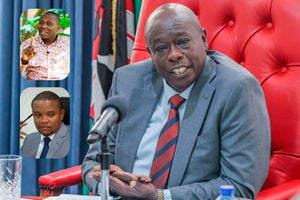Sh22 billion spent on cancer drugs in the last 3 years

A patient undergoes cancer screening at the Integrated Molecular Imaging Center at the Kenyatta University Teaching Referral and Research Hospital.
What you need to know:
- To date, Nairobi Hospital has received 62,127 units of medication valued at Sh15,802,097,365.
- In Kenya, 42,116 new cancer cases are recorded every year with 27,092 deaths recorded annually.
Five regional hospitals have received cancer drugs worth Sh5.3 billion under a plan to decentralise access to lifesaving supplies so patients don't travel long distances to Nairobi.
Nairobi Hospital has benefited from the bulk (Sh15 billion) of the Sh22 billion supplies "reflecting its role in hosting the majority of patients," according to an internal report by the Ministry of Health (MoH) on the distribution of the drugs since December 2021 to date.
Under a deal between the Ministry of Health and The Max Foundation, the Kenya Medical and Supplies Agency (Kemsa) has distributed medical supplies worth Sh22,477,248,903 to the five key hospitals in Nairobi, Coast, Rift Valley and Western regions.
To date, Nairobi Hospital has received 62,127 units of medication valued at Sh15,802,097,365.
Moi Teaching and Referral Hospital received 8,977 units valued at Sh2,386,353,913; Nakuru Provincial General Hospital got 5,967 units valued at Sh1,581,824,638; Jaramogi Oginga Odinga University of Science & Technology has benefited from 3,560 units valued at Sh914,726,825 KES; and Coast Provincial General Hospital received 1,560 units valued at Sh430,161,841.
At the time (2021), Kenyatta University Teaching, Referral & Research Hospital was undergoing evaluation to be an additional center to help offload some patients, thereby improving access to medications, the health ministry explains.
The National Cancer Registry System of Kenya (NACARe-KE system) highlights that 42,116 new cancer cases are recorded every year with 27,092 cancer deaths recorded annually.
This means that in Kenya, 2 out of 3 people diagnosed with cancer will succumb to the disease.
The data at the registry also shows that 70 per cent of cancer cases are diagnosed in advanced stages while only 23 percent of cancer patients in the country can access cancer management services they need.
“The top 5 counties with the highest cancer cases are Nairobi, Nakuru, Kiambu, Machakos and Nyeri,” the national registry highlights, adding that the median cancer diagnosis age in women in the country is 53 years while in men it is 62 years.
The data also notes that the most common cancers reported include Breast Cancer (15.1 per cent), Cervical cancer(13.3 per cent), Cancer of the Esophagus (11.8 per cent), Prostate Cancer (10.1 per cent) and Colorectal cancer (7.1 per cent).
According to the government, the distribution of vital cancer drugs was as a result of a collaboration that has significantly enhanced access to essential healthcare services in the 5 areas thus ensuring that both urban and remote populations receive the medical care they need.
“This is largely thanks to a collaborative effort between the health ministry and The Max Foundation in a pioneering effort to enhance access to essential cancer treatment.
The collaboration formalized a Memorandum of Understanding (MoU) to decentralize the Glivec International Patient Assistance Program (GIPAP) across Kenya supported by Max Access Solutions (MAS),” the report highlights.
This initiative,MoH says, aimed to bring critical care closer to patients diagnosed with chronic myeloid leukemia (CML) and gastrointestinal stromal tumors (GIST), particularly in far-flagged counties.
“The cost of imatinib, a vital medication for treating CML and GIST, presented a significant financial challenge for many Kenyan patients, with a monthly dose priced at approximately 270,000 Kenyan Shillings.
For most patients, this cost was prohibitive,”Kemsa explained, adding that however, the Max Foundation, through its MAS program, provided this life-saving drug free of charge to Kenyan patients thus ensuring access to treatment without financial ruin.
Kemsa notes that previously, patients had to travel to Nairobi for their treatment — a journey that posed significant challenges.
The MoU initiated a decentralized approach, allowing patients to receive treatment at regional and county levels, making it more accessible and reducing the need for long-distance travel.
“Under this agreement, GIPAP services were made available at Nakuru Provincial General Hospital, Moi Teaching and Referral Hospital, Jaramogi Oginga Odinga Teaching and Referral Hospital, and Coast Provincial General Hospital, in addition to Nairobi Hospital, which continued providing both first-line and second-line treatment.
This decentralization significantly eased the burden on patients, enabling them to access vital medications closer to home,”Kemsa added.
The Ministry of Health, through Kemsa, provided clearance, warehousing, distribution, and quality assurance services.
The medical supplies agency also ensured that these medications reached the designated hospitals efficiently and managed last-mile delivery to guarantee availability at the point of care.
The report further explains that the order management for these medications was coordinated through the National Cancer Control Program (NCCP), which ensured that the quantities requested by each facility] were aligned with the number of patients they served.
This process was managed through the National Oncology Dashboard, a tool that tracked patient numbers and medication needs, ensuring accurate and timely distribution with Max Foundation overseeing the quality of care and submitting regular progress reports.
“The Kenyan government supported this initiative by streamlining administrative processes, including granting tax exemptions for the donated medicines. Kemsa’s role in clearance, warehousing, distribution, and last-mile delivery, combined with their commitment to quality assurance, was vital in ensuring these life-saving medications were available across the country,” Kemsa said.
The MoU was set to be in effect for five years, with provisions for review and extension based on the program’s success.
During this period, healthcare providers in regional hospitals were trained to manage and monitor treatment for CML and GIST patients, significantly increasing access to cancer care, particularly in underserved regions.
“The initiative was expected to improve survival rates and enhance the quality of life for those battling cancer.
This effort represented a significant advancement in Kenya’s healthcare system, underscoring the importance of international partnerships in addressing critical health challenges, “the government states in the report.





